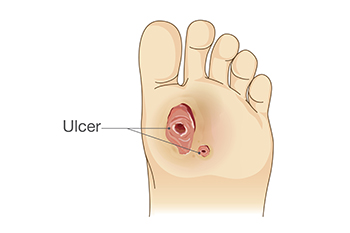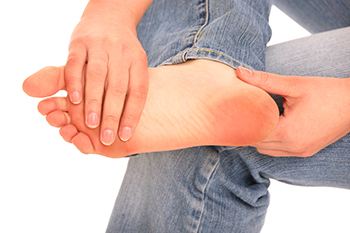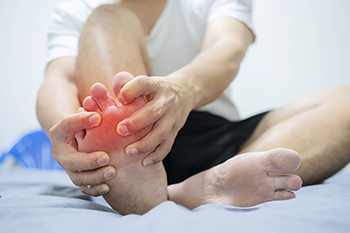Connect With Us
Blog
Items filtered by date: July 2023
The Seriousness of a Diabetic Foot Ulcer

People who are diabetic are generally concerned about developing a diabetic foot ulcer. Proper wound care treatment is crucial for this type of infection, and serious consequences may ensue if prompt medical attention is not received. Research has shown that approximately 25 percent of diabetic patients will develop a foot ulcer, and implementing prevention techniques may help to avoid this. An essential step for this type of wound care treatment can be to remove the necrotic or dead wound tissue. This is referred to as debridement, and there are various ways to treat this. It is important to reduce any pressure on the wound, and often an off-loading boot is worn. The wound is typically drained, and the healthy underlying tissue is examined. Effective prevention methods can include keeping glucose levels within a normal range, drinking plenty of water daily, and eating healthy foods. If you have a diabetic foot ulcer, it is strongly suggested that you are under the care of a podiatrist who can provide the proper treatment.
Wound care is an important part in dealing with diabetes. If you have diabetes and a foot wound or would like more information about wound care for diabetics, consult with David A. Edmonds, DPM from Advanced Podiatry Associates. Our doctor will assess your condition and provide you with quality foot and ankle treatment.
What Is Wound Care?
Wound care is the practice of taking proper care of a wound. This can range from the smallest to the largest of wounds. While everyone can benefit from proper wound care, it is much more important for diabetics. Diabetics often suffer from poor blood circulation which causes wounds to heal much slower than they would in a non-diabetic.
What Is the Importance of Wound Care?
While it may not seem apparent with small ulcers on the foot, for diabetics, any size ulcer can become infected. Diabetics often also suffer from neuropathy, or nerve loss. This means they might not even feel when they have an ulcer on their foot. If the wound becomes severely infected, amputation may be necessary. Therefore, it is of the upmost importance to properly care for any and all foot wounds.
How to Care for Wounds
The best way to care for foot wounds is to prevent them. For diabetics, this means daily inspections of the feet for any signs of abnormalities or ulcers. It is also recommended to see a podiatrist several times a year for a foot inspection. If you do have an ulcer, run the wound under water to clear dirt from the wound; then apply antibiotic ointment to the wound and cover with a bandage. Bandages should be changed daily and keeping pressure off the wound is smart. It is advised to see a podiatrist, who can keep an eye on it.
If you have any questions, please feel free to contact our offices located in Northampton and Allentown, PA . We offer the newest diagnostic and treatment technologies for all your foot care needs.
Gout Pain Can Be Managed
The Importance of Taking Foot Pain Seriously

Our feet are the foundation of our support and facilitate our mobility. While it is common to experience foot pain occasionally, dismissing or ignoring it can have serious consequences. Foot pain can stem from various causes, ranging from simple issues like ill-fitting footwear to underlying medical conditions that require immediate attention. Since such pain can arise from multiple factors, it is important to identify the source to differentiate between discomfort that may be temporary and signs of a more serious problem. Medical conditions, such as diabetes, with the common complication of neuropathy, or deep vein thrombosis involving blood clots can cause foot pain, and it is crucial to address these issues promptly. Age-related foot problems, such as arthritis, can cause chronic foot pain that requires care. Given the diverse causes of foot pain and the potential severity of complications, if you are having such pain, it is strongly suggested that you consult a podiatrist for an accurate diagnosis and suitable treatment.
Foot Pain
Foot pain can be extremely painful and debilitating. If you have a foot pain, consult with David A. Edmonds, DPM from Advanced Podiatry Associates. Our doctor will assess your condition and provide you with quality foot and ankle treatment.
Causes
Foot pain is a very broad condition that could be caused by one or more ailments. The most common include:
- Bunions
- Hammertoes
- Plantar Fasciitis
- Bone Spurs
- Corns
- Tarsal Tunnel Syndrome
- Ingrown Toenails
- Arthritis (such as Gout, Rheumatoid, and Osteoarthritis)
- Flat Feet
- Injury (from stress fractures, broken toe, foot, ankle, Achilles tendon ruptures, and sprains)
- And more
Diagnosis
To figure out the cause of foot pain, podiatrists utilize several different methods. This can range from simple visual inspections and sensation tests to X-rays and MRI scans. Prior medical history, family medical history, and any recent physical traumatic events will all be taken into consideration for a proper diagnosis.
Treatment
Treatment depends upon the cause of the foot pain. Whether it is resting, staying off the foot, or having surgery; podiatrists have a number of treatment options available for foot pain.
If you have any questions, please feel free to contact our offices located in Northampton and Allentown, PA . We offer the newest diagnostic and treatment technologies for all your foot care needs.
What Is Gout and Who Gets It?

Gout is a type of painful inflammatory arthritis that affects joints. It is caused by the buildup of uric acid in the body, which is a substance produced from the breakdown of purines. Purines are naturally occurring in the body, but they also come from some foods, such as red meat, oily fish, organ meats, and high sugar beverages, including alcohol. When more uric acid is produced than can be excreted, it can form into crystals that settle in the joints and one can have a gout attack. Usually, excess uric acid is secreted through the kidneys, but sometimes this does not happen because of conditions like diabetes, high blood pressure, or enzyme abnormalities. Gout can be a hereditary condition and is more common in men. It may also affect women after menopause. The key symptoms of gout are swelling, redness, and severe pain in the affected joint. It can attack a person in spurts and commonly affects the joint at the base of the big toe. It can be uncomfortable to walk and wear shoes. If your big toe hurts, it is suggested that you see a podiatrist for a proper evaluation and guidance on how to manage gout or anything else that might be going on.
Gout is a painful condition that can be treated. If you are seeking treatment, contact David A. Edmonds, DPM from Advanced Podiatry Associates. Our doctor will treat your foot and ankle needs.
What Is Gout?
Gout is a form of arthritis that is characterized by sudden, severe attacks of pain, redness, and tenderness in the joints. The condition usually affects the joint at the base of the big toe. A gout attack can occur at any random time, such as the middle of the night while you are asleep.
Symptoms
- Intense Joint Pain - Usually around the large joint of your big toe, and it most severe within the first four to twelve hours
- Lingering Discomfort - Joint discomfort may last from a few days to a few weeks
- Inflammation and Redness -Affected joints may become swollen, tender, warm and red
- Limited Range of Motion - May experience a decrease in joint mobility
Risk Factors
- Genetics - If family members have gout, you’re more likely to have it
- Medications - Diuretic medications can raise uric acid levels
- Gender/Age - Gout is more common in men until the age of 60. It is believed that estrogen protects women until that point
- Diet - Eating red meat and shellfish increases your risk
- Alcohol - Having more than two alcoholic drinks per day increases your risk
- Obesity - Obese people are at a higher risk for gout
Prior to visiting your podiatrist to receive treatment for gout, there are a few things you should do beforehand. If you have gout you should write down your symptoms--including when they started and how often you experience them, important medical information you may have, and any questions you may have. Writing down these three things will help your podiatrist in assessing your specific situation so that he or she may provide the best route of treatment for you.
If you have any questions, please feel free to contact our offices located in Northampton and Allentown, PA . We offer the newest diagnostic and treatment technologies for all your foot care needs.
Choosing the Right Cane or Walker to Prevent Falls

As people age, pain, weakness, and balance become important considerations, especially as it concerns falling. That being the case, it is only a matter of time before some type of walking aid may be needed to prevent falls. Selecting the right type of cane or walker is paramount, along with having them fitted correctly to your body. Whether you choose a cane or walker depends on how much support is needed. A cane supports about 25 percent of your weight, and a walker can support around half of your weight. Three types of canes are single-point for early balance problems, four-point for increased balance or stability concerns, or seat canes that allow you to rest. Types of walkers include a standard walker, which needs to be picked up as you move forward, and a front-wheeled walker that rolls along with each step. A four-wheeled walker offers more stability and can come with a seat and brakes. Depending on the type of walking aid, it should have non-skid rubber tips and foam or rubber grips for the hands. For the correct fitting of a cane or walker, it is suggested that you make an appointment with a podiatrist.
Preventing falls among the elderly is very important. If you are older and have fallen or fear that you are prone to falling, consult with David A. Edmonds, DPM from Advanced Podiatry Associates. Our doctor will assess your condition and provide you with quality advice and care.
Every 11 seconds, an elderly American is being treated in an emergency room for a fall related injury. Falls are the leading cause of head and hip injuries for those 65 and older. Due to decreases in strength, balance, senses, and lack of awareness, elderly persons are very susceptible to falling. Thankfully, there are a number of things older persons can do to prevent falls.
How to Prevent Falls
Some effective methods that older persons can do to prevent falls include:
- Enrolling in strength and balance exercise program to increase balance and strength
- Periodically having your sight and hearing checked
- Discuss any medications you have with a doctor to see if it increases the risk of falling
- Clearing the house of falling hazards and installing devices like grab bars and railings
- Utilizing a walker or cane
- Wearing shoes that provide good support and cushioning
- Talking to family members about falling and increasing awareness
Falling can be a traumatic and embarrassing experience for elderly persons; this can make them less willing to leave the house, and less willing to talk to someone about their fears of falling. Doing such things, however, will increase the likelihood of tripping or losing one’s balance. Knowing the causes of falling and how to prevent them is the best way to mitigate the risk of serious injury.
If you have any questions, please feel free to contact our offices located in Northampton and Allentown, PA . We offer the newest diagnostic and treatment technologies for all your foot care needs.

